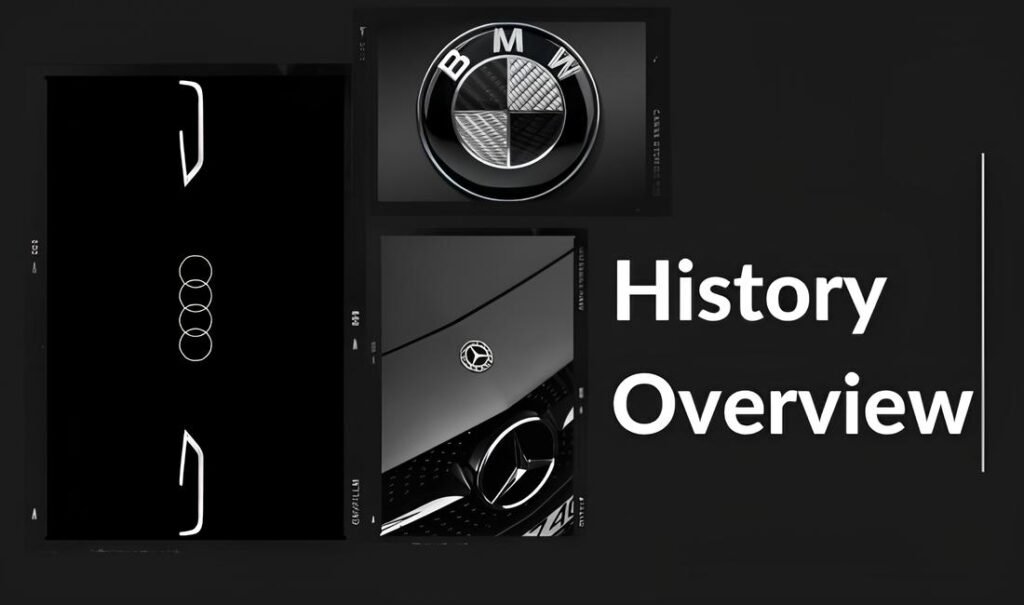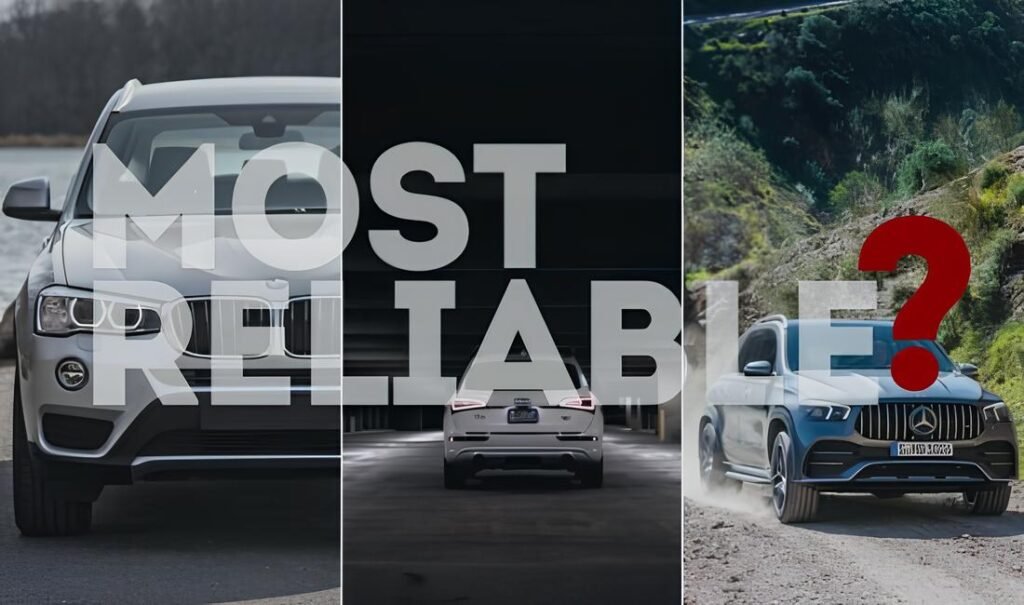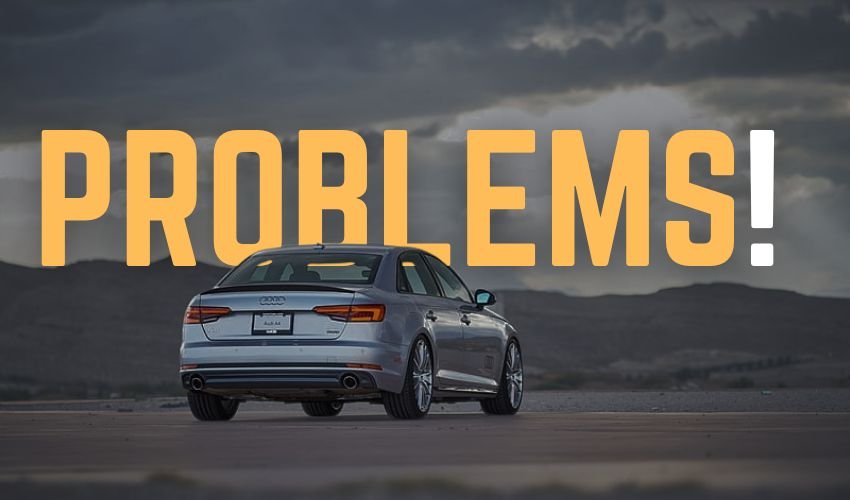When the market is flooded with tons of options, with every single brand giving better and better designs with newer features.
German cars have become a standard for their styling, cutting-edge technology, and strong resale value. However, among these names, BMW, Mercedes, and Audi stand out as the pinnacle in the luxury car market.
These three names will always come to your mind when thinking about buying a luxury car infused with opulent technology, that’s also somewhat reliable and gives that flagship driving experience that you and I deserve.
If you’re also looking to buy from one of the three German brands, this article will make a complete comparison and will highlight everything you should know about these three before stepping into the showroom and buying the car.
- History of Mercedes, BMW, and Audi
- BMW Vs. Mercedes Vs. Audi: Overall Reliability Ranking
- Most Common Reliability Problems
- Which Brand Needs Less Maintenance?
- Audi, BMW, and Mercedes: Key Differences
- Best Models of BMW, Audi, and Mercedes
- Audi Vs. BMW Vs. Mercedes: Cars Sold in 2024
- Which Is Better: Mercedes, BMW or Audi?
History of Mercedes, BMW, and Audi

The history of Audi, BMW, and Mercedes isn’t new. But this isn’t just about the numbers, but about the legacy these German brands hold. Audi to begin with, wasn’t a part of the legendary century-old rivalry between BMW and Mercedes.
Despite Audi joining later, has managed to be among the top charts with BMW and Mercedes to be a part of one of the greatest and iconic rivalries in the automotive history.
A Century-Old History of BMW and Mercedes
The history of BMW and Mercedes isn’t new. Both brands have one of the oldest rivalries in history. Mercedes-Benz started making cars in 1886 when Karl Benz patented the first ever Mercedes model named “Benz Patent-Motorwagen“. BMW followed with its first production car, the BMW 3/15, introduced in 1929.
Fast forward to today, both BMW and Mercedes-Benz have enjoyed a healthy rivalry for decades, often poking fun at each other in their ads. One ad I have in mind was the BMW’s “front-wheel-drive animals” campaign from the mid-2000s.
These ads showed animals that normally move with their back legs edited to look like they were powered from the front, with the message “That’s why we don’t have front-wheel drives.” Ironically, BMW later introduced front-wheel-drive models, following Mercedes-Benz’s lead.
Despite the competition, there’s mutual respect between the brands. When Dieter Zetsche stepped down as Mercedes-Benz’s CEO in 2019, BMW created a special ad honoring him, even though he had worked for their rival most of his career. This came after Mercedes had made an ad thanking BMW for 100 years of competition.
The BMW-Mercedes rivalry touches every part of their business – from design to production to sales. This stems from their different car philosophies: BMW focuses on making sporty “track beasts” (like a racing driver would enjoy), while Mercedes aims to create comfortable “executive chariots” (perfect for being driven by a chauffeur).
Audi’s Entry into the Rivalry
Audi’s origins date back to Auto Union, a conglomerate formed in 1932 that included Audi, Horch, DKW, and Wanderer. After World War II, Auto Union was resurrected and eventually acquired by Volkswagen in the 1960s.
Audi became a significant player in the luxury segment during the 1980s with its Quattro all-wheel-drive technology and premium sedans, positioning itself as a competitor to both Mercedes-Benz and BMW as one of the best luxury car brands globally.
You May Also Read: BMW vs Lexus
BMW Vs. Mercedes Vs. Audi: Overall Reliability Ranking

Many people think that German car brands don’t have reliable cars and simply mock German engineering claims, but that’s certainly not true.
Over the years, all three brands have massively improved their reliability game and have produced many amazingly reliable vehicles like the BMW X3, the recent 8 Series Gran Coupe, the Mercedes-Benz CLA, and the Audi A4.
But considering the complex engineering demanding more maintenance, it’d be interesting to see which brand is the most reliable and needs less cost to maintain. With this in mind, BMW seems the most reliable and safer in the long run than both Mercedes and Audi.
When we check studies and surveys from sites like Consumer Reports and J.D. Power, where we can defer scores of each brand for how safe they are and how rarely they break down. All three brands score great, but Audi is slightly behind in terms of how often their cars need repairs. They still make good, solid cars, but Mercedes and BMW cars tend to have fewer problems in the long run.
Just remember – since these are luxury cars, fixing them costs more money. The parts are expensive because they’re high-quality, and you might need to take your car to special mechanics who know how to work on these brands.
Most Common Reliability Problems

While all three brands are going to give you the very best driving experience, the complex engineering makes the cars vulnerable to common issues that most owners face. Audi, BMW, and Mercedes have different kinds of problems but often overlapping ones relating to reliability.
Electrical issues are prevalent across all three brands, from window regulators down to malfunctions in the dashboard. Other Exhaust and emission control system problems are considerably higher than the average in the industry.
Several models from BMW and Mercedes have an exhaust fault rate of about 16-17%, with the industry standard being about 5%.
Costly issues with specific Audi models include Audi’s notorious oil consumption problems in models like the A4, transmission issues in the Q5, and coolant leaks in the A3-specific model.
BMW also struggles with emission control faults in series like the 1 Series and 5 Series Saloon, while Mercedes wrestles with its version of engine mount deterioration and air suspension failures, together with premature catalytic converter troubles. Interestingly, older Mercedes models also have significant rusting problems, particularly in vehicles from the 1990s and early 2000s.
These are the most common issues that I stumbled upon in different articles, especially this Reddit thread with owners highlighting the issues that these German brands have yet to fix, even in the newer models.
Which Brand Needs Less Maintenance?

For those concerned about the maintenance cost of these brands, let’s have a face-off, BMW vs Audi vs Mercedes, and understand which one is cheaper in terms of maintenance.
According to the annual data of 2024, Audi is the cheapest of the three German luxury brands in terms of maintenance costs. The average annual maintenance cost for Audi is $570, compared to the BMW maintenance cost of $968 and around $908 for Mercedes. The data in the long run goes by…
1-5 Years
- BMW: $1,700
- Audi: $2,050
- Mercedes-Benz: $3,500
6-10 Years
- BMW: $8,100 | 9,800 total
- Audi: $9,000 | $11,050 total
- Mercedes-Benz: $9,600 | $13,100 total
Mercedes consistently has the highest costs across all maintenance categories. However, it’s important to note that these figures are averages, and actual costs can vary depending on specific models and individual circumstances.
Additionally, other sources like RepairPal indicate that Audi’s overall maintenance costs can be higher than the industry average when considering a longer time frame and including repair costs.
Winner– Audi/BMW
Audi, BMW, and Mercedes: Key Differences

In the battle of these high-end, luxurious German brands, let’s highlight the key deciding factors that will help us find the best brand in the market.
Build Quality
If you compare the design, Mercedes solos both Audi and BMW, sticking its roots to make elegant, sophisticated and stylish vehicles. However, all three brands have been disappointed with their newer models when it comes to build quality.
Where Audi and BMW were busy making bigger grills, Mercedes used to be regarded as the most solid brand among the three luxury brands. But in recent years, Mercedes has gotten worse every year diluting the brand and their reputation for solid build.
Both BMW and Audi have improved their build quality significantly in recent years, leading above Mercedes in Consumer Reports rankings.
Safety Features
Mercedes – Standard in all Mercedes vehicles includes several safety features like active brake assist, attention assist feature, blind spot assist, rearview camera, advanced airbag technology, LED headlamps & taillamps, crosswind assist, and LED daytime running lamps.
Audi – Audi has also integrated different safety features across its vehicles, such as anti-lock brakes, security systems, overhead bags, Audi pre-sense, adaptive cruise control, active lane assist, parking lane assist, advanced airbag systems, electronic stability control, and various driver-assistance technologies to enhance safety and driving comfort.
BMW being the safest here, offers opulent features like an active protection system, active blind spot detection, rear cross-traffic alert, and frontal collision warning with city collision in all its vehicles to ensure the safety of the passengers.
Driving Experience
Better Driving experience comes with technologically advanced integrated systems in the cars. It is crucial to understand the brand to find the most reliable car brand in the market.
Most Mercedes cars offer a keyless start, sportier styling, a panoramic sunroof, and front heated seats, and some AMG Models offer iconic AMG styling and larger alloys, indicating the importance of the best driving experience for the users.
Audi keeps its vehicles updated with the latest technological features, lush interiors, and exotic exterior designs. Its Quattro all-wheel drive, LED lights, Android Auto, MMI Navigation Plus infotainment, and advanced technological features make its driving experience one of the good brands to choose cars.
BMW is long known for its sporty vehicles, speed, upgraded wheels, and suspension. This automobile brand offers powerful and reliable engines giving sporty and comfortable rides, even on the larger wheels. Doesn’t matter which BMW you buy; you’re expected to get the flagship driving experience that is powerful, luxurious, and aggressive.
Lastly, comparing the driving experience of all three German brands, BMW and Mercedes are much better than Audi. But you’ll find BMW better than Mercedes in many aspects, offering better driving dynamics, integrated technology, comfort, and safety features.
Undisputed Winner – BMW
Best Models of BMW, Audi, and Mercedes

To this date, the luxury car world is still buzzing with innovation and performance from brands such as Audi, BMW, and Mercedes-Benz, among others.
BMW remains strong on the back of its classic powerhouse, giving a diverse line to suit diverse tastes, including sporty sedans and practical SUVs. Mercedes-Benz leads in luxury and tech innovation, while Audi perfectly balances sportiness with refinement.
Below are the best models from each brand serving a different purpose that’ll be enough to narrow down your choices. I have only listed the reliable models so you can always count on buying one of these…
Best For Speed Enthusiasts
- BMW – For Speed Aficionados, the BMW M series is to choose from. The M series is specifically dedicated to those appreciating exhilarating high speed and precise handling. Popular models include the new 2025 BMW M5, 2017 BMW i8, 2023 BMW M2, and 2015 BMW M6 Competition.
- Audi – The fastest Audi models include the 2025 Audi RS Q8, 2023 Audi R8 GT, 2023 Audi RS e-tron GT, and 2017 Audi RS3. These cars are here to give you the very best driving experience, come with a luxury interior, and behave like a sports car should be.
- Mercedes – Mercedes is not new in creating sports cars; the brand has the longest history out of all three German Brands. The fastest Mercedes models include the 2018 Mercedes AMG C63S, AMG GT 63 S E, SLS AMG Black Series, and 2017 Mercedes AMG GTR.
For Families
- BMW – For families seeking a blend of luxury and practicality, the 2017 BMW X3, 2024 BMW X6, BWW X5, X1, and X4 are perfect, given the spacious interior and large cargo space outfitted with advanced safety features.
- Audi – Audi offers some fantastic options across the board for families giving spacious interiors and family-friendly features. These models include the Audi A3 Sportback, Audi Q3, Audi Q7, and Audi A6 Avant.
- Mercedes – The Mercedes-Benz GLB, GLE, and GLS are excellent choices for families that epitomize luxury and space. These SUVs boast exceptional legroom and comfort, equally good driving experience, and safety features.
For EV Buyers
- BMW – For those who are interested in EVs, BMW offers a diverse lineup. Plenty are sporty, efficient, and spacious. Electric BMWs include the BMW i3, BMW iX, BMW i7, and iX3.
- Audi – The Audi e-Tron, Audi Q4 e-tron, and Q6 e-Tron are excellent choices in the arsenal of electric cars. Whether you’re after a family car or something more luxurious, you can count on these SUVs for a smooth friendly driving experience.
- Mercedes – The brand has some of the best electric cars to choose from, including the Mercedes EQE, EQA, EQS, and EQB. The cars feature some of the best designs, are comfortable, and will give a premium feel.
| Also Read: Best Toyota SUV Models |
Audi Vs. BMW Vs. Mercedes: Cars Sold in 2024
| Audi | BMW | Mercedes Benz | |
|---|---|---|---|
| Global sales 2024 | 1,671,218 | 2,200,177 | 1,983,400 |
| Asia | N/A | 960,951 | 892,100 |
| Europe | 664,551 | 641,800 | 641,800 |
| USA | 196,576 | 371,346 | 324,500 |
| Germany | 198,342 | 267,285 | 213,500 |
| North America | 240,771 | 480,994 | 365,400 |
| China | 649,434 | 714,530 | 683,600 |
| Electric Vehicles | N/A | 593,215 | 367,600 |
Which Is Better: Mercedes, BMW or Audi?
As far as the stats are concerned, BMW and Mercedes are the dominant competitors in the race for reliability. Audi is a reliable option as far as maintenance costs are concerned.
Moreover, comparing the reliability score from JD Power and safety ratings, BMW is more reliable and safer than Mercedes and Audi. Mercedes gets the second place followed by Audi.
In a nutshell, if you are a calm driver, Mercedes would suit you, if you are a sportsman, BMW will amaze you, and if you need low maintenance cost, Audi is best for you.
In this battle of car brands, winners can be different in different periods, and people with change their preferences with each new model launch.
Frequently Asked Questions
[helpie_faq group_id=’180’/]




